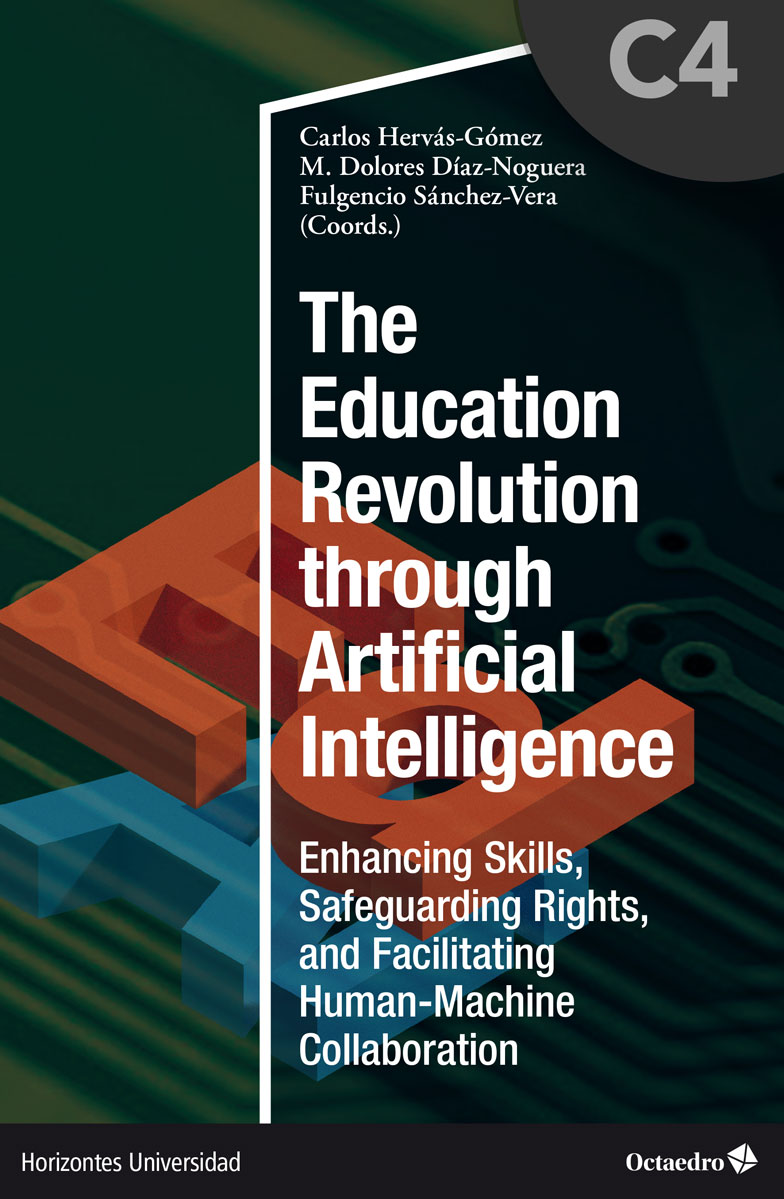FICHA TÉCNICA
Fecha de publicación:
04/11/2024
Doi del capítulo:
Título del libro: The Education Revolution through Artificial Intelligence
URL del libro:
ISBN del libro: 9788410282582
DOI del libro:
Abstract
This chapter examines the impact of Artificial Intelligence (AI) on education and creative work, highlighting the need for interdisciplinary analysis in the context of the interrelationship between technoscience and society. The ethical challenges of AI, such as algorithmic biases and epistemic injustice, and its influence on educational and decision-making processes are discussed. The text emphasizes the importance of regulation and accountability in the use of AI to preserve democratic values and fundamental rights, while also reflecting on the future of education in the age of AI.
Palabras clave
Autores
Inmaculada Perdomo Reyes
Universidad de La Laguna, Spain
mperdomo@ull.edu.es
https://orcid.org/0000-0003-4838-7278
Fulgencio Sánchez-Vera
Universidad de la Laguna, Spain
fsanchev@ull.edu.es
https://orcid.org/0000-0002-0697-9120
Betty Estévez Cedeño
Universidad de la Laguna, Spain
bestevec@ull.edu.es
https://orcid.org/0000-0002-1590-952X
Cómo citar
Perdomo Reyes, I., Sánchez-Vera, F., Estévez Cedeño, B. (2024). The Ethical and Epistemic Impact of Artificial Intelligence in Education. In Hervás-Gómez, C., Díaz-Noguera, M. D., Sánchez-Vera, F. (Coords.), The Education Revolution Through Artificial Intelligence (pp. 57-70). Octaedro. https://doi.org/10.36006/09651-1-04
Referencias bibliográficas
«Arendt, H. (1996). Verdad y política. Entre el pasado y el futuro. Ocho ejercicios sobre la reflexión política. Península.
Barad, K. (2007). Meeting the Universe Halfway: Quantum Physics and the Entanglement of Matter and Meaning. Duke University.
Byung-Chul Han (2022). Infocracy. Polity.
Catà Figuls, J. (2023, 27 November). Margaret Mitchell: “Las personas a las que más perjudica la inteligencia artificial no deciden sobre su regulación”. El País, https://elpais.com/tecnologia/2023-11-27/margaret-mitchell-las-personas-a-las-que-mas-perjudica-la-inteligencia-artificial-no-deciden-sobre-su-regulacion.html?ssm=whatsapp_CC
Coeckelbergh, M. (2021). Ética de la inteligencia artificial. Cátedra.
Criado Pérez, C. (2019). Invisible Women: Exposing Data Bias in a World Designed for Men. Chatto & Windus.
Duede, E. (2022). Instruments, agents, and Artificial Intelligence: novel epistemic categories of reliability. Synthese, 200, 491. doi.org/10.1007/s11229-022-03975-6
Echeverría, J. (2003). La revolución tecnocientífica. FCE.
Eubanks, V. (2018). Automating Inequality: How High-Tech Tools Profile, Police and Punish the Poor. St. Martin’s.
European Commission (2020). White Paper on Artificial Intelligence. A European approach to excellence and trust. https://op.europa.eu/es/publication-detail/-/publication/ac957f13-53c6-11ea-aece-01aa75ed71a1
Franssen, M. y Kroes, P. (2009). Sociotechnical Systems. In J. Olsen, S. Pedersen, & V. Hendricks (Eds.). A Companion to the Philosophy of Technology. Blackwell.
Habermas, J. (1984). The Theory of Communicative Action. Beacon.
Hao, K. (2020). Claves del artículo por el que Google despidió a la líder de ética de IA. MIT Technology Review. https://www.technologyreview.es//s/12958/claves-del-articulo-por-el-que-google-despidio-la-lider-de-etica-de-ia
Jasanoff, S. (Ed.) (2004). States of Knowledge. The Co-production of Science and Social Order. Routledge.
Jasanoff, S. (2016). The Ethic of Invention. Technology and The Human Future. W.W. Norton & Company.
Krishnan, A., Abdilla, A., Jung Moon, A., Affoso Souza, C., Adamson, C., Lach, E., Ghazal, F., Fjel, J., Taylor, J., Havens, J. C., Jayaram, M., Morrow, M., Rizk, N., Ricaurte Quijano, P., Cetin, B., Chatila, R., Dotan, R., Mhlambi, S., Jordan, S., &Rosenstock, S. (2021). AI Decolonial Manyfesto. https://many-festo.ai/
Larson, E. J. (2022). El mito de la Inteligencia Artificial. Por qué las máquinas no pueden pensar como nosotros lo hacemos. Shackleton.
Pérez Colomé, J. (2020, 13 December). Por qué el despido de una investigadora negra de Google se ha convertido en un escándalo global. El País. https://elpais.com/tecnologia/2020-12-12/por-que-el-despido-de-una-investigadora-negra-de-google-se-ha-convertido-en-un-escandalo-global.html?event_log=go
Ricaurte, P. (2022). Ethics for the majority world: AI and the question of violence at scale. Media, Culture & Society, 44, 726-745. https://doi.org/10.1177/01634437221099612
Sánchez Vera, F., Estévez Cedeño, B., Perdomo Reyes, I., & Lozano Galván, E. (2023). Prácticas académicas deshonestas y desarrollo profesional de los estudiantes de magisterio: análisis de los aspectos emocionales y motivacionales implicados. In Santos Villegas, M. J., Alcalá del Olmo Fernández, M. J., Fernández Cerero, J., & Montenegro Rueda, M. Desafíos educativos a través de la interdisciplinariedad en la investigación y la innovación. Dykinson.
Sen, A. (1999). Development as Freedom. Oxford University.
Tarabini, A. (2020). ¿Para qué sirve la escuela? Reflexiones sociológicas en tiempos de pandemia global. Revista de Sociología de la Educación. https://doi.org/10.7203/RASE.13.2.17135
Terrones R, A. (2021). Inteligencia artificial responsable. Humanismo tecnológico y ciencia cívica (doctoral thesis). Universitat de València
Universidad de Jaén (2021, 3 June). La Universidad de Jaén, pionera en poner en marcha asistentes conversacionales de atención al usuario. Diario Digital. https://diariodigital.ujaen.es/institucional/la-universidad-de-jaen-pionera-en-poner-en-marcha-asistentes-conversacionales-de
Universidad de Murcia (2018, 5 July). La Universidad de Murcia presenta a Lola, un asistente de inteligencia artificial para ayudar a los nuevos alumnos. Gabinete de Prensa de la Universidad de Murcia. https://www.um.es/web/sala-prensa/-/la-universidad-de-murcia-presenta-a-lola-un-asistente-de-inteligencia-artificial-para-ayudar-a-los-nuevos-alumnos
Wacjman, J., & Young, E. (2023). Feminism confronts AI. In J. Browne, S. Cave, E. Drage, & Kerry McInerney (Eds.). Feminism and AI (pp. 47-64). Oxford University.
Young, E., Wajcman, J., & Sprejer, L. (2023). Mind the gender gap: inequalities in the emergent professions of Artificial Intelligence (AI) and data science. New Technology, Work and Employment, 1-24. https://doi.org/10.1111/ntwe.12278»
